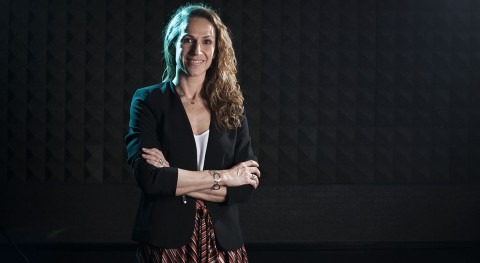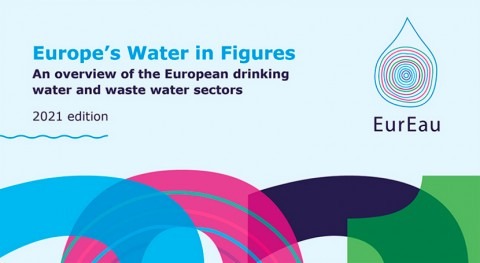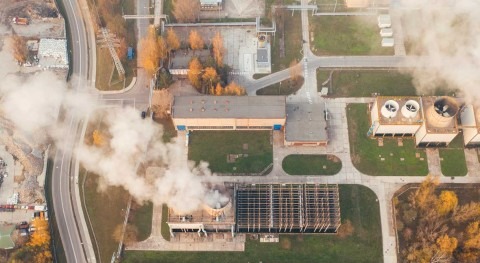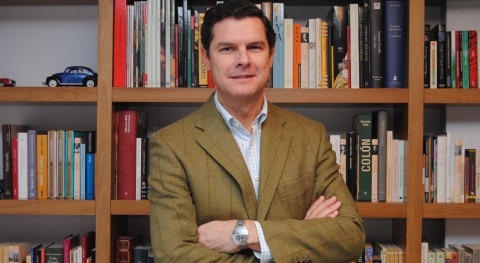At the end of May, Europe’s water services, EurEau, elected Dr Claudia Castell-Exner as the Federation’s President for the next two years.
With over 25 years of experience working in the water sector at both the national and the European levels, we interview EurEau’s new president on the challenges Europe’s urban water currently faces and what its priorities will be in the coming years.
Question: Firstly, we would like to know briefly about your career path in EurEau.
Answer: I first came into contact with EurEau through my work with DVGW around 27 years ago. I joined the committee on economics and legal affairs but I soon moved to the drinking water committee. I began chairing this committee in 2011 before being invited to participate in the Executive Committee and as Vice President of EurEau in 2015.
Throughout my membership of EurEau I was always fascinated with how EU policies and legislation are made, and I willingly accepted opportunities to represent EurEau‘s views and positions. Over the years, we’ve been very busy, meeting Commission officials, MEPs and Member States representatives to help make more robust EU water policies.
Q: What challenges does Europe’s urban water sector currently face?
A: First of all, water is valuable – and essential – for our society. Our sector is experienced in providing fundamental services but we must address the challenges we face if we are to keep bringing efficient, sustainable and affordable water services to our customers.
More needs to be done to protect and conserve our water resources and the environment since water is under pressure from many sources of pollution. In 2018, only 40% of our surface water bodies achieved good ecological status. At the same time, 25% of our ground water reservoirs showed some contamination. We need the ’Control at Source Principle’ to be properly implemented to prevent pollutants entering our water systems. Polluters must pay to mitigate the pollution they are responsible for. Ageing water service infrastructure and climate change will require far-reaching adjustment measures and long term investments at all levels.
All these challenges will impact our water resources, how we approach drinking and waste water treatment as well as the affordability of water services.
Therefore, we need a holistic approach comprising European, national and local actions to address each of these challenges effectively. Policies should be coordinated, and existing principles, as enshrined in the EU treaties, fully implemented.
More needs to be done to protect and conserve our water resources and the environment since water is under pressure from many sources of pollution
Q: What will your main priorities be during the next two years as President of EurEau?
A: I’m taking over a federation that is in very good shape. I want to further raise the value of water and of water services. My aspiration is to build on the successes achieved by my predecessors, and I see a great chance for EurEau to develop an even stronger voice for the European water sector in the coming political debates.
From my point of view water needs to be prioritised on the political agenda, as it is all too often overlooked, especially regarding economic interests from industry and agriculture.
In the next years, I see EurEau – to name just a few:
- playing a decisive role in the current and upcoming EU legislation such as on the Water Framework, Drinking Water and Urban Waste Water Treatment Directives
- putting the subject of water services’ investment needs front and centre in political discussions
- establishing producers responsibility in EU legislation, e.g. for the whole life cycle of pharmaceuticals
- being a strong supporter of Agenda 2030 and SDG6
- being a partner in international water diplomacy.
Q: You've mentioned that water is often sidelined on the political agenda, how do you plan to make it a priority?
From my point of view water needs to be prioritised on the political agenda, as it is all too often overlooked, especially regarding economic interests from industry and agriculture
A: Yes, we need a strong commitment, from all over Europe, to stand for the value of water as all too often, safe, reliable and affordable water services are taken for granted. All stakeholders in the chain of producing drinking water and treating waste water must accept their responsibilities and provide what is needed by water services today and for future generations: stringent environmental protection, qualified people, necessary investments for water infrastructure to name just a few.
The implementation of the risk-based approach in the revised Drinking Water Directive is a good example of this. For the first time ever, EU policies are directly linking the requirements for drinking water quality with the protection of drinking water resources. I see here again a big chance to raise public awareness for the value of water as well as an opportunity for stronger engagement from national environment and health authorities to prevent and mitigate risks in the water cycle.
EurEau enjoys excellent relations with the EU institutions. We will build upon and develop these. Maintaining a dialogue with political decision-makers at both the national and European levels is paramount. This is where we can be creative, where we can offer our expertise as well as our practical knowledge and experience, and present our position on policy matters. EurEau is considered ‘the’ competent body to be contacted by all European institutions when it comes to water services. As a result, our arguments are listened to and integrated into the political decision-making processes in Europe. I’m confident we can continue to do this!

Q: How will EurEau tackle the accelerating impacts of global warming in the urban water sector?
A: Climate change and its impacts have been the focus of public attention for many years and especially due to the recent student ‘Fridays for future’ strikes.
Climate change will directly and significantly affect water service providers in many parts of Europe, i.e. in terms of raw water availability and quality as well as the operation of the waste water infrastructure. The response of water services to climate change encompasses both mitigation (reducing the impact of water services) and adaptation (become resilient to the effects) measures.
Given that water service providers are used to long-term planning and investment periods as well as having the know how to cope with changing parameters, we are convinced to succeed in adapting to the consequences of climate change. But this has to be managed in close cooperation with researchers, politicians and other stakeholders.
In order to identify suitable adaptation measures, water operators are analysing their individual situations and figuring out:
- Which impacts and consequences will affect my system?
- Which assets and processes of my system are particularly sensitive to the expected impacts?
- Which adaptation options do the ongoing operation schemes and the established management tools offer?
- What needs to be considered with regard to future investments?
The continuous integration of the findings into all planning and decision-making processes of the operation is crucial for the water sector.
Public authorities have to enforce the ‘Polluter-Pays’ Principle: it is too easy to resort to the ‘consumer-pays’ principle
Q: EurEau often emphasises the importance of maintaining water affordability. What are the Federation’s plans in regard to this issue?
A: Affordability is one of the dimensions of the human right to water and sanitation: in order to implement the SDG6 in the EU, we need to invest in the maintenance and renewal of water infrastructure to keep water services affordable for all European citizens, now and in the future.
European water services provide 24/7 drinking water which is safe, wholesome and clean as well as the professional collection and treatment of waste water. Access to drinking water is a reality in all European Member States and we want to keep it this way for the future generations.
Water services, however, have a cost that is covered by the water bill. So far water customers have been the only ones that have paid for the protection of water resources, while the Water Framework Directive clearly states that the costs have to be shared between households, farmers and industry. Public authorities have to enforce the ‘Polluter-Pays’ Principle: it is too easy to resort to the ‘consumer-pays’ principle.
Q: Could you tell us about the importance of urban water in European policies compared to other water uses?
A: Water is life. We need sufficient quantities of quality water for good health, a clean environment and functioning economies. As stated in the WFD, “water is not a commercial product like any other but, rather, a heritage which must be protected, defended and treated as such.” Water has a value at all stages; drinking water sources should be protected and maintained and so treated waste water also has a value and benefit in agricultural irrigation and in reducing water scarcity.
Q: EU citizens have just voted their representatives in the European Parliament. Could you tell us what EurEau plans to ask from these newly elected MEPs?
A: We want all MEPs to guarantee our water heritage. Over the next five years, they should act to protect the environment and ensure that the 510 million water consumers in Europe continue to have access to safe and clean water, now and for future generations. Strong, fit-for-purpose EU legislation that is correctly implemented is good for people, the economy and the environment.
Many of the key pieces of water legislation that affects how we as water operators work will be revised soon. EurEau needs support from MEPs to ensure that the revised Drinking Water Directive remains an effective and appropriate legal framework for drinking water quality and surveillance.
The Urban Waste Water Treatment Directive is one of the pieces of legislation to be possibly revised. As part of this, we want to see contaminants prevented from entering the waste water system, either through control at source, or if this is not effective, Extended Producer Responsibility should apply.
The Water Framework Directive is also up for revision. We want to see this ambitious directive extended beyond 2027.











